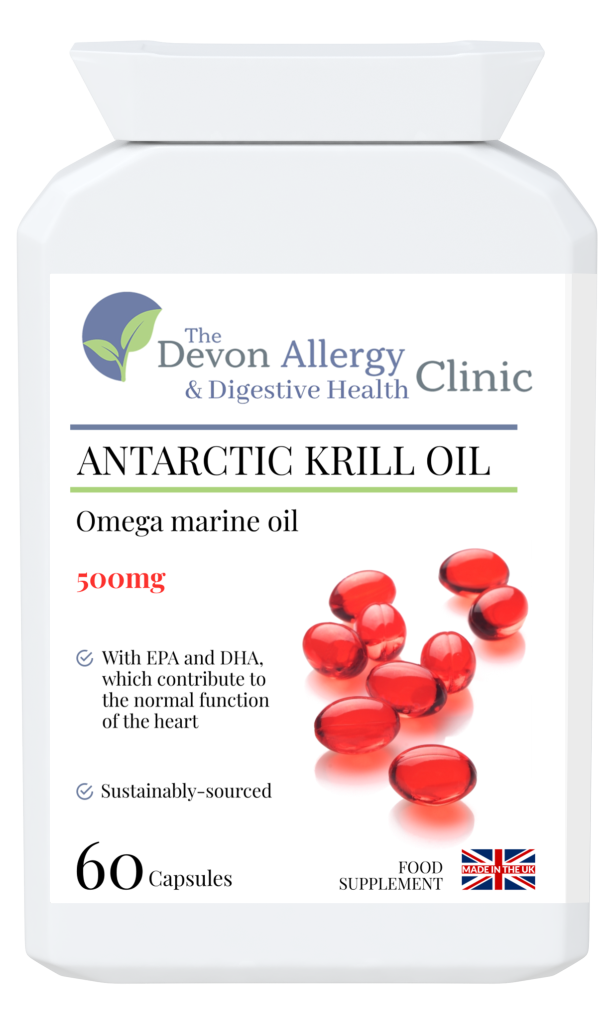Antarctic Krill Oil
£16.99
Description
Also known as Euphausia superba, krill oil is a source of Omega 3 oil. It contains two types of Omega 3 fatty acid: eicosapentaenoic acid (EPA) and docosahexaenoic acid (DHA).
Krill oil also contains astaxanthin, as well as phospholipids – two properties which set it apart from traditional fish oils.
People tend to use krill oil for the same reasons that they use fish oil, flaxseed oil or other Omega 3 fatty acids. However, unlike fish oil, krill oil does not cause fishy burps or leave an after-taste.
Our high grade Antarctic Krill Oil supplement provides 500mg of krill oil per capsule, which is sourced exclusively from sustainable fisheries in the Antarctic through our partners Aker BioMarine™ (who work with World Wildlife Foundation Norway to ensure sustainable krill harvesting).
More information:
Antarctic Krill Oil at a glance…
Omega 3 from krill oil
EPA and DHA
Astaxanthin
Phospholipids
Support of heart and blood pressure
Support of vision
Support of brain function
Sustainably-sourced
500mg per capsule
Easy-to-swallow small capsules
No fishy after-taste
Our Antarctic Krill Oil capsules contain only krill oil, rather than krill oil combined with ordinary fish oil as found in some other products.
About the ingredients…
Krill oil
Krill oil is derived from small shrimp-like marine crustaceans found in oceans around the world, but they are most common in cold-water oceans, such as the Antarctic and North Pacific. There are 18 species and an estimated 500 – 750 million tonnes of krill worldwide. This makes them the most significant biomass of animals in the world. They are a staple food for fish, whales, sharks, seals, penguins and other sea birds. Krill eat phytoplankton (microscopic plant life). Unlike many fish, one of the key benefits of krill is that they are low enough on the food chain so that they do not pose a threat of containing mercury.
Omega 3 oils
Omega 3 oils are generally found in coldwater fatty fish, deep green vegetables and some grains and seeds. Krill oil is a source of two types of Omega 3 fatty acid: eicosapentaenoic acid (EPA) and docosahexaenoic acid (DHA).
EPA and DHA contribute to the normal function of the heart (with a daily intake of 250mg) – click here and here for EFSA scientific opinion.
DHA and EPA contribute to the maintenance of normal blood pressure (with a daily intake of 3g of EPA and DHA)* – click here and here for EFSA scientific opinions.
DHA contributes to the maintenance of normal blood triglyceride levels (with a daily intake of 2g of DHA and when taken in combination with EPA)* – click here for EFSA scientific opinion.
DHA contributes to maintenance of normal brain function (with a daily intake of 250mg of DHA) – click here and here for EFSA scientific opinion.
DHA contributes to maintenance of normal vision (with a daily intake of 250mg of DHA) – click here and here for EFSA scientific opinion.
*Users should not exceed a supplemental daily intake of 5g of EPA and DHA combined.
Phospholipids
Krill oil also provides phospholipids – naturally-occurring molecules that are a major component of all cell membranes.
Astaxanthin
Astaxanthin is a pigment that belongs to a group of natural substances called carotenoids. It occurs naturally in certain algae and causes the pink/red colour of krill.
The presence of astaxanthin also helps to keep krill oil stable without the need for additives, protecting the Omega 3 fatty acids from becoming rancid due to oxidisation.
Additional information
| INGREDIENTS | Per 715mg capsule: Of which… Ingredients: Krill Oil (Euphausia Superba) Extract (Crustacean), Capsule Shell (Bovine Gelatin), glycerol, water. ALLERGY ADVICE: for allergens, see ingredients in bold. Not suitable for persons with an allergy to fish or shellfish. People with coagulopathy or taking blood thinning medication should consult their doctor before use. Not intended for use by pregnant or lactating mothers. Not suitable for vegetarians and vegans. |
|---|---|
| USAGE | 1 – 2 capsules to be taken per day, or as advised by a health practitioner. Warnings and allergy advice: |

